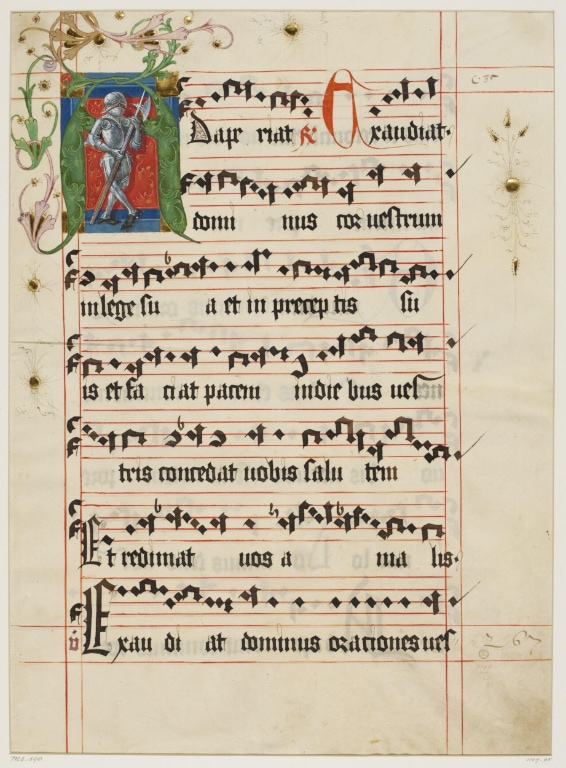Manuscript Cutting: Leaf from an Antiphoner with an Initial ‘A’ showing a Knight in Armour

Unknown Artist
Leaf from an Antiphonary with an Illuminated Initial ‘A’ showing a Knight in Armour
Mainz, Germany, 1490s
Ink, gold and pigments on parchment, 367 x 250 mm
Victoria and Albert Museum (No. 1107:28)
This cutting is a leaf from an Antiphonary with a rare depiction of a knight. It features a song that would have been sung in the evening (Vespers) for the first Sunday of October. The connection between the calendar and music was strongly linked in the medieval world and this piece is an example of this relationship.
Visually the Hufnagel notations were part of the direction for the singers as to how to perform the piece.
The development of Hufnagel notation around 1200 led to a change in the way that song was performed in churches. Gregorian chant, a style of singing which was restricted in scale and had no musical accompaniment, had been the standard for sung devotions until the advent of Hufnagel notation. This style of writing music enabled singers to follow along with melodies that had nuances.
The knight within Christian art is often seen as a protector and vanquisher against evil. This imagery is derived from the biblical verse ‘take the helmet of salvation, and the sword of the Spirit, which is the word of God’ (Ephesians 6:13-16). Similarly, Vespers for the medieval audience was time devoted to reflecting on the day and being grateful for their faith, therefore the images act as a helpful visual aid for the singers to vocalize with gratitude and as a community.
There is little evidence that nineteenth-century collectors of illuminated cuttings took much interest in historical musical notation despite the great differences with that of their own day, and serious research into it had to wait until the later twentieth century.
Audio Clip & Transcript
Audio: transcription and translation
‘Adaperiat dominus cor vestrum in lege sua et in praeceptis suis et faciat pacem in diebus nostris.’
‘May the Lord open your heart to his law and his commandments and grant peace in our days.’
Aperiat Tibi (Antifona) from Canto Mozárobe sung by Schola Antiqua
© 2015 Adigital Classics